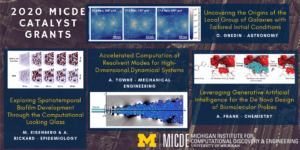
Since 2017 the Michigan Institute for Computational Discovery & Engineering (MICDE) Catalyst Grants program has funded a wide spectrum of cutting-edge research that combines science, engineering, mathematics and computer science. This year the program will fund four new projects that continue this tradition: Prof. Aaron Frank (Chemistry) and his group will spearhead efficient strategies to rapidly develop treatments for emerging diseases– a need made more compelling by the current COVID-19 Pandemic. Their approach combines generative artificial intelligence models and molecular docking to rapidly explore the space of chemical structures and generate target-specific virtual libraries for drug discovery. Prof. Marisa Eisenberg (Epidemiology, Mathematics, and Complex Systems) and Prof. Alexander Rickard’s (Epidemiology) groups will develop novel computational techniques to study biofilm architectures. Biofilms are complex assemblages of microbial cells that form on almost any natural and man-made surface. They cause several debilitating diseases, and can even damage machinery and equipment, elevating the understanding of their behaviour to a critical need. Prof. Oleg Gnedin (Astronomy) will develop novel techniques to tailor the mathematical initial conditions from which to simulate chosen regions of the universe. The resulting insights will help uncover the origins of our own galaxy, the Milky Way. Finally, Prof. Aaron Towne (Mechanical Engineering) will advance the modeling of complex, turbulent flows and other large-scale systems in engineering science. His research will enable orders of magnitude of acceleration in the computation of extremely large scale flows in a number of engineering systems.
“These four projects have the potential to catalyze and reorient the directions of their research fields by developing and harnessing powerful paradigms of computational science”, said Krishna Garikipati, Professor of Mechanical Engineering and of Mathematics, and MICDE’s Director. “MICDE’s mission is to lead the advances in computational science research by bringing together interdisciplinary teams at U of M, and these projects embody that vision.”
More about MICDE’s catalyst grant program and the projects can be found at micde.umich.edu/catalyst.